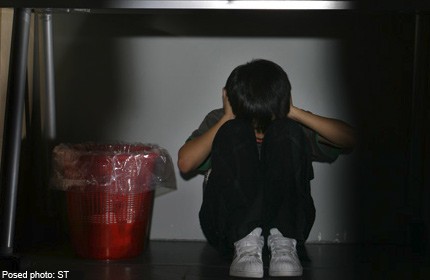About 9% of S'poreans suffer from phobias at least once in their life: Expert


SINGAPORE - She was a successful businesswoman.
Ironically, she feared interacting with people.
She had what specialists call social phobia - an irrational fear of being negatively judged by others.
It got so bad she would make excuses to avoid business meetings and get out of lunch sessions with colleagues.
The breaking point came when she cancelled a talk she had flown overseas to give after the panic and anxiety she felt in her hotel room got too overwhelming.
The woman, whom we are not naming because of patient confidentiality, was a client of Dr Thomas Lee, a psychiatrist at The Resilienz Mind Psychological Medicine and Counselling Centre some time ago.
"Phobias can affect your marriage and your relationships. If your phobia is a significant one, you shouldn't trivialise it. You should seek treatment," says Dr Lim Boon Leng,a psychiatrist at Gleneagles Hospital.
About 9% of S'poreans suffer from phobias at least once in their life
Irrational fear
A phobia is defined as an irrational fear or aversion to something.
But not all fears qualify as phobias.
"It crosses the line to become a phobia when the person takes huge measures to avoid the thing they are afraid of, or have an over-the-top reaction to it," explains Dr Lim.
So while a person who fears dogs may cross the road to avoid them, a person with a phobia will likely scream or start to panic by looking at a photo of a dog.
According to Dr Kelvin Ng, associate consultant with the Department of Community Psychiatry at the Institute of Mental Health, some common symptoms include intense fear, anxiety and a feeling of being squeezed.
Patients can also experience heart palpitations, breathlessness, cold sweats, dizziness, nausea and even fainting. Dr Lim estimates that about 9 per cent of Singaporeans suffer from phobias at least once in their life.
Dr Lim estimates that about 9 per cent of Singaporeans suffer from phobias at least once in their life.
That equates to about 486,000 people.
Of these, 1 in 5 are "severe" cases, meaning the phobias cause significant disruption to patients' everyday lives.
Doctors say that there are no formal statistics for Singapore. Dr Ng also thinks that the number of cases here are likely under-diagnosed as most people will not come forward.
Instead, they try to cope by avoiding the object or situation - even if it jeopardises their health, like those who fear needles and refuse vaccines.
Dr Lee shared another anecdote about a patient who had a fear of flying.
"He was not comfortable telling his boss about his phobia of flying, and would keep making excuses to avoid going overseas for business."
As a result, he lost promotion opportunities.
Causes
Abnormalities in the brain, parental influence and childhood trauma are causes for phobias, say psychiatrists.
"If a parent repeatedly labels something as scary or yucky, the kid might be influenced irrationally and grow up with that fear," says Dr Lim.
He also says that people who are bullied as children sometimes develop social phobia.
Another trigger could be a traumatic incident like witnessing a drowning and then developing an excessive fear of water.
Some phobias develop without clear causes, say psychiatrists.
Treatment
Psychiatrists advise patients with a phobia to try and avoid triggers as far as possible. Sometimes, doctors can facilitate this by issuing an official diagnosis of the phobia.
"I had a patient in the army who was afraid of worms. I wrote him a letter excusing him from field camp," says Dr Lim.
Other treatments include therapy.
"Patients can attend therapy where we gradually expose them to what they are afraid of, so that they eventually learn to control their responses to the fear," he explains.
An expatriate he worked with, who had a fear of heights, was first encouraged to visualise being on top of a tall building or structure.
When he felt comfortable, Dr Lim then showed him pictures of high places, such as views from skyscrapers and other tall buildings.
The final step involved standing at a place of height with a loved one next to him.
Says Dr Lim: "This worked really well for him, even though it took six months."
The woman with the social phobia also got her problem under control after medication and therapy.
Those around phobia sufferers can help.
"Most employees won't speak up about things like this, but if you're a boss and you know your employee suffers from a phobia, be understanding. Encourage them to seek help," says Dr Lee.
As for parents?
"Don't shelter your kids," says Dr Lim.
"A lot of phobias come about because kids are told at an early age that something is scary and should be avoided."

This article was first published on May 25, 2014.
Get The New Paper for more stories.